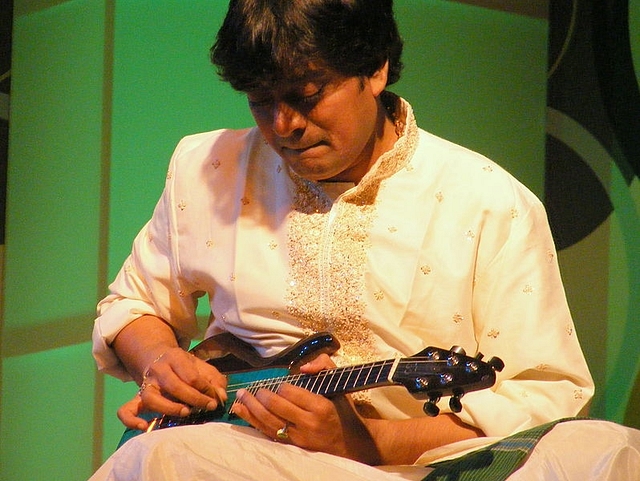
Mandolin U Shrinivas: Boy Wonder, Modern Maestro
Despite his death at 45, Shrinivas will be counted among Carnatic music’s all time greats
Superstar Carnatic musician Uppalapu Shrinivas, popularly known a ‘Mandolin’ Shrinivas died in Chennai today of liver failure. He was only 45. A child prodigy whose performing career began when he hadn’t yet turned 10, Shrinivas popularised and adapted the little known instrument called mandolin to Indian classical music. He did experiment, and rather successfully, with crossover music in collaboration with international greats such as John McLaughlin, Michael Brook, Trey Gunn, and Nigel Kennedy. His international breakout moment came in 1985 at the Berlin Jazz Festival. The sinewy 15-year-old, by popular demand, had to extend his concert by an hour—something that would happen almost every time he performed.
Despite his early popularity in the international music scene, he thought of himself as nothing other than a Carnatic musician.
I first heard him live in 1987 when he performed at a newly consecrated temple in Jabalpur for an audience made up almost entirely of homesick south Indians. There was immense curiousity about the boy genius and the unusual instrument he used. Because Shrinivas was too shy to speak, his father had to pick up the microphone and explain to the audience that a mandolin was nothing but a ‘baby guitar”. The interest at that time was heightened also because of the swirling rumors about Shrinivas’ cunning minders exploiting his immense talents for gains of which very little went to him or his family.
Shrinivas had a turbulent personal life. He fought a long drawn out divorce with his wife U Sree, that went right up to the Supreme Court. The SC in 2012 ruled that he was treated “cruelly” by his wife.
I met Shrinivas again in 2000, as a writer for a Carnatic music journal, at his modest ‘Maruthi Nilayam’ home in Chennai’s Saligramam, a preferred neighbourhood for people who made their living in the Tamil film industry. Satyanarayana, Shrinivas’ father, and first guru played the instrument for film music composers.
Speaking about why he gelled effortlessly with jazz musicians in the international festival circuit Shrinivas said the Western listeners were used to the sound of electric mandolin but were awestruck by the ability of a Carnatic practitioner to bend the notes at will unlike their musicians. The jaw-droppingly swift riffs, and lightning fast transitions Shrinivas could produce, was the envy of many jazz guitarists. “Carnatic is the best and the most complex system of music. If you are trained in it, you can pick other forms up relatively easily,” he said. Somewhat apologetically, he went on to narrate an incident about giving John McLaughlin a tutorial on a particularly complex Carnatic phrase that had caught his fancy, over two days.
Shrinivas was a veritable superstar among Carnatic musicians. In the late 1990s and early 2000s when attendances at concert halls during the Chennai music ‘season’ began thinning (there has been a remarkable revival, but that’s a story for another time), Shrinivas and KJ Yesudas were perhaps the two artistes who performed to sell out auditoriums concert after concert.
Despite Shrinivas’ death at such a young age, he will without doubt find a place in the pantheon of Carnatic music’s greatest.